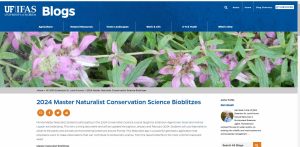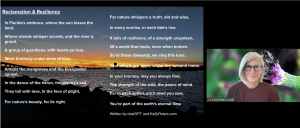UF is buzzing about AI throughout its research, teaching, and extension programs. It became apparent in the Winter 2024 Florida Master Naturalist Conservation Science coursework that AI-generated content and technology was sneaking into my nature-based Extension program. My co-instructor Andrea Lazzari and I taught this course using a hybrid format. Our students seem to be embracing the use of AI as it becomes more and more ubiquitous in our everyday lives. Personally, I find it an area of academic interest. It showed up in this course through the use of iNaturalist, ChatGPT, and even something as understated as map apps.

iNaturalist
In our Winter 2024 Master Naturalist course, we saw an obvious application of AI when we used iNaturalist. As part of their coursework, students conducted self-directed field trips and were asked to bioblitz their observations. Fifteen bioblitzes were conducted at preserves across the Florida peninsula with almost a thousand observations being logged into iNaturalist. iNaturalist’s AI helped students identify various plants and animals observed by making suggested identifications. Crowdsourcing helped verify these observations. From an instructor’s point of view, we could watch our students make observations and see exactly where they were and what they saw within their preserve geofences. You can check out these bioblitzes in my blog HERE.

ChatGPT
We also saw an amazing AI application when Florida Master Naturalist Kelly Peters share a poem on conservation. It was fascinating as she explained how she did it using ChatGPT. Best of all, the poem was good! Kelly followed all the academic rules and properly marked the poem as being co-authored by her with the help of the ChatGPT AI.
iPhone Maps and Google Maps
One last way we used AI in our Florida Master Naturalist Conservation Science course was the use of iPhone Maps and Google Maps. Our last course field trip was to Lakeside Ranch Stormwater Treatment Area in western Martin County. There we learned about efforts to clean water and how wildlife benefits from the clean water. This is a very remote location without an address. I was able to find a satellite map and placed a pin drop on the map and sent that information to participants. This enabled them to determine the best route for travel, any obstructions along the way, and even gave us an approximate travel time. How long would it take you to get to Lakeside Ranch STA?
The Google map pin drop is https://maps.app.goo.gl/gEWG3HwPvoi6QAt19?g_st=ic
The Apple Map pin drop is https://maps.apple.com/?ll=27.119302,-80.672600&q=Dropped%20Pin&t=h
Conclusion
Artificial intelligence, AI, is the hottest new technology people are talking about. If you do not think AI is reshaping the way you do things, think again. The trends are unmistakable and will likely reshape our planet (hopefully for the good of mankind). UF is on the forefront of this innovation adoption. It has invested heavily in AI technology with the development of HiPerGator, one of the fastest supercomputers in higher education, and academic programs building UF as a premiere AI University.
Extension programs are open to all persons without regard to race, color, sex, age, disability, sexual orientation, religion, or national origin.
An Equal Opportunity Institution. UF/IFAS Extension, University of Florida, Institute of Food and Agricultural Sciences, Andra Johnson, dean for UF/IFAS Extension. Single copies of UF/IFAS Extension publications (excluding 4-H and youth publications) are available free to Florida residents from county UF/IFAS Extension offices.
 3
3
